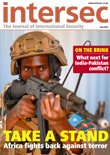Middle Eastern chaos
Anthony Tucker-Jones talks to former Defence Minister Sir Nicholas Harvey about the uncertain future facing the Arab world.
ATJ: You have recently been in Amman and Cairo, how would you characterise the political atmosphere?
NH: There are anxieties in both. Jordan’s big issue is refugees from the Syrian conflict: they are in the eye of the storm, and the recent census showed that 30 percent of residents are non-nationals. Egypt is settling down and the recent Parliamentary elections continued the process of political normalisation, but the security challenges are hitting their tourism industry hard so they are quite apprehensive.
ATJ: Can you tell us a little about the work you have been conducting there?
NH: Helping build the political institutions and culture. Egypt’s new constitution gives the Parliament significant powers – akin to those of the US Congress. But the proliferation of independent MPs and small parties limits what it can do with those powers. Jordan is going through a rapid process of building a party political democracy, which is exciting as it too has been dominated by independents and a non-party culture that limits democratic effectiveness.
ATJ: Do you see Egypt and Jordan as democratic bulwarks against the chaos currently engulfing much of the Middle East and North Africa?
NH: Yes, Jordan is an oasis of calm amidst the turmoil of the Middle East, and obviously wants to keep it that way. Egypt has greater challenges, but seems to be quite stable politically now and can rebuild economically if it can keep on top of the security challenge.
ATJ: Under President Sisi it seems Egypt is back exactly where it was 30 years ago under Hosni Mubarak. Is there much hope for Egyptian democracy and will the military ever refrain from meddling in politics?
NH: It took us centuries for our democracy to mature to where it is now. If the 90 or so political parties in Egypt could brigade themselves into about five or six, then they would be able to use the levers given to them in the constitution to build a more normal democratic culture, which would reduce the likelihood of future military interventions. But it is a slow process.
ATJ: Last year Washington resumed military aid to Egypt, suspended since 2013 when the military ousted President Morsi. Some commentators argue that Washington is now prioritising security and stability in Egypt at the cost of promoting democracy and human rights – is this a fair accusation?
NH: The US does just that all over the world, as does the UK and most of the West. That is our greater priority and it is best to be candid about it. However, the work of the NGO I am helping, and several others, is also evidence of the West trying to help create a healthier democratic culture capable of improving human rights.
ATJ: Sinai Province – a jihadist group aligned to Daish or Islamic State predecessor organisation – conducted over 400 attacks in North-Eastern Sinai between 2012-2015. Do you think it’s only a matter of time before the tourist resorts in Southern Sinai are targeted?
NH: I think the Egyptian security forces are reasonably capable and will do everything they can to thwart that ambition, but I agree that an ongoing campaign is likely to be necessary.
ATJ: Sinai Province is fielding heavy weapons (including anti-aircraft and anti-tank missiles, mortars and heavy machine guns) – this seems a notable step up from the lightly armed guerrilla tactics employed by Egyptian militant groups operating in the 1980s and 1990s. Do you think Sinai is facing all-out civil war?
NH: There has been a catalogue of increasingly capable kit available on black markets, particularly since Libya and other conflicts. That certainly ups the stakes, but I would hesitate to call it all-out civil war: those responsible can be deadly in effect, but are not particularly numerous.
ATJ: Is the trouble in Sinai simply an inevitable overspill from Hamas-controlled Gaza or are other factors at work?
NH: That is one contributory factor, but perhaps the greater concern is that Daish views all thinly populated and thus hard-to-police areas as prime targets.
ATJ: The reach of SP now extends to Cairo, the Nile Delta and Western Desert – did you witness tighter security than on your previous visits?
NH: Somewhat, though as ever one can see scope for improvement.
ATJ: Did you feel safe in Cairo as Islamic militants began kidnapping Westerners from the Egyptian capital in 2014?
NH: There are still plenty of Westerners about on the streets of Cairo and they are accepted by locals as part of the normal scenery. There is a latent risk but as yet no cause for generalised alarm.
ATJ: Having declared a state of emergency in Northern Sinai it is worrying that the Egyptian military, for all its hardware, has been unable to contain the violence. Are the Egyptians confident they can prevail?
NH: They are certainly determined. And they are increasingly supported internationally, but there is no doubt that it will be a long and tough ongoing campaign.
ATJ: Jordan, rather like Algeria, has been able to avoid much of the trouble following the Arab Spring and the growth of militant groups, why do you think that is?
NH: An enlightened and relatively liberal regime and an economy functioning properly and sustaining living standards certainly helps.
ATJ: Egypt and Jordan recently signed a military cooperation agreement – both will be keen to tighten security along their mutual frontier, which borders Sinai. Surrounded by Egypt to the West and Syria and Iraq to the North and East it’s remarkable Jordan is as stable as it is.
NH: I agree, but their diplomacy is effective as is their security effort: they get on with things quietly and discreetly and avoid too much controversy or enmity.
ATJ: Jordan is now host to large numbers of Syrian refugees – can the Jordanian Government withstand the strain of this latest crisis?
NH: No – they are only keeping the show on the road with substantial external help, and are concerned that the rest of the world underestimates the scale of what they are facing.
ATJ: Despite Prime Minister Cameron gaining authority to join the air war over Syria, it is evident that Iraq remains the focus of British efforts. During mid-December the RAF conducted 22 air strikes in the Ramadi area in a 24-hour period. Can the UK really influence events in Syria?
NH: No, not remotely – in my view the British contribution is principally symbolic. Of course our allies welcome some extra air power, but they weren’t particularly short of it. The situation will end up having to be resolved diplomatically with the Russians, and we might have done better to keep ourselves detached in order to lead on that.
ATJ: Is your assessment that the air strikes vote on 2 December 2015 was more to do with Cameron exercising control over the House of Commons, rather than as he put it taking out the “snake’s head” in Syria? After all, the US Air Force has been attempting this for almost a year.
NH: It is hard to know what it was all about, but he had clearly been itching to reverse the vote from 2013. I am concerned that there is no real strategy. We know that wars are won on the ground not in the sky, and there is no ground force to deliver what we are trying to achieve. There may be 70,000 “fighters” as the PM suggested, or even more, but they are essentially just local people trying to protect their own villages. They are neither capable nor willing to travel elsewhere and try to defeat either Assad or Daish. The ‘free army’ is now basically crushed. Assad and the Russians are left to battle Daish with Western help in the sky. We will end up having to deal with them.
ATJ: There have been allegations that Turkey is buying black market oil from IS-held oilfields in Syria. Is this just greed or does Ankara have a motive for sustaining IS – certainly the Turks have no desire to see Syria’s Kurds in the ascendant, so does this account for their dual track air attacks on IS and the PKK Kurdish separatists?
NH: Quite possibly; the Kurdish dimension is high up their agenda. Assad is also said to be buying oil from IS: he has to get it from somewhere.
ATJ: IS fighters have been seeking to gain a hold over Libya’s oil port at Sidra. This seems to indicate a deliberate policy to extend IS’ oil revenues. Libya has the world’s ninth largest oil reserves. What can be done by the international community?
NH: Tricky, as Libya is difficult terrain to operate in, but blockading might be a possibility.
ATJ: In Iraq events seem to be swinging against Daish. Could the recapture of the city of Ramadi signal the beginning of the end for IS in Iraq?
NH: Not necessarily, but I agree that they are in retreat in Iraq. But they may well be able to bunker down in some places for quite some time yet.
ATJ: Does the Government victory at Ramadi mark a newfound professionalism within the Iraqi Security Forces? Or was this achieved thanks to US air power?
NH: Probably more the latter, but it remains a tragic mystery why the Iraqi forces were so hopeless earlier, after all that has been invested in them. One would have expected more, so one hopes the trouble-shooting is improving them.
ATJ: Having retaken Ramadi at the end of December 2015 do you think the Iraqi Government really has the ability to retain control of this much-contested city?
NH: Only with a lot of help.
ATJ: Will Mosul now become the focus of the fighting in Iraq during 2016?
NH: Yes I think it is likely to be.
ATJ: Ultimately can Egypt and Jordan continue to weather the widespread regional upheaval?
NH: Yes, I am cautiously optimistic that things are heading slowly in the right direction in Egypt, and that Jordan will remain the region’s bright hope if the world wakes up to the scale of their challenge and increases the help it gives.
ATJ: What is your prognosis for the Middle East in 2016 – are there any grounds for optimism?
NH: Not much! I can’t see things looking much better this time next year.
Anthony Tucker-Jones is intersec’s Terrorism and Security Correspondent. He is a former defence intelligence officer and is now a widely published defence commentator specialising in regional conflicts and counter terrorism









